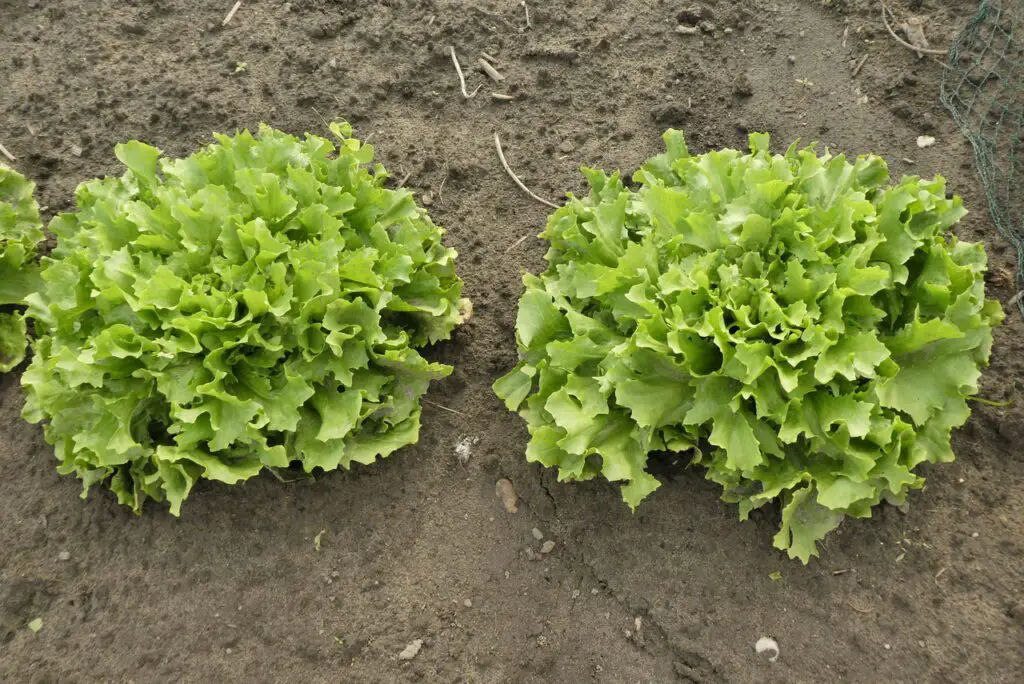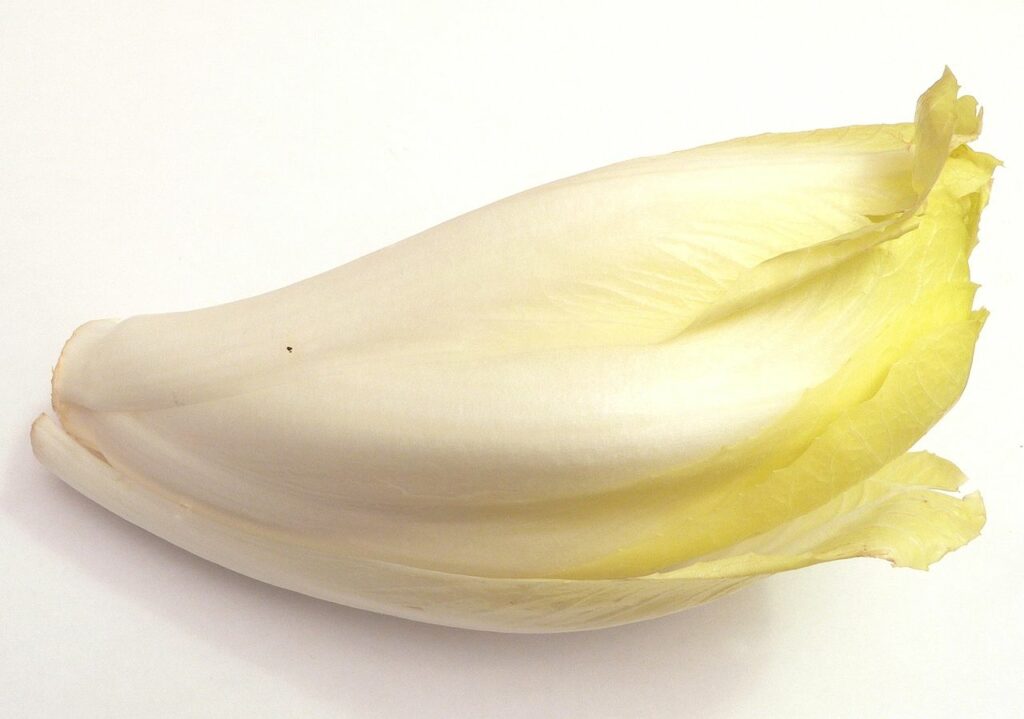Endive is a leafy vegetable that is commonly consumed by humans, either cooked or raw. But many pet owners often wonder whether it is safe to give endive to their furry friends.
Dogs have different digestive systems compared to humans, so it’s important to know which human foods are safe for them to eat.
In this article, we will explore the nutritional value of endive and whether it’s safe for dogs to eat.
Can Dogs Eat Endive?

Yes, dogs can safely eat raw, cooked, and purred endive in moderation. Endive is an excellent source of vitamins and minerals such as vitamins A and K, folate, calcium, and potassium.
These nutrients can have numerous benefits for dogs, including boosting their immune system, promoting healthy bones, and supporting healthy heart function.
However, it’s important to introduce Endive gradually to your dog’s diet and in small amounts to avoid any digestive issues such as diarrhea, vomiting, or gas.
Additionally, it is not recommended to add any seasonings or oils when feeding dogs endive, as these can be harmful to their digestive system.
It’s also important to note that endive should not replace a balanced and complete diet for dogs.
While dogs can benefit from adding vegetables to their diet, their primary source of nutrition should still come from high-quality dog food.
Consult with your veterinarian if you are unsure about introducing Endive into your dog’s diet, especially if your dog has any underlying health conditions.
Overall, endive can be a healthy and safe addition to your dog’s diet if given in moderation and without any added seasonings or oils.
See also: 47 Safe Vegetables To Feed Your Dog. Puppy Power!
How Many Endives Can Dogs Eat?

When it comes to feeding endive or any other vegetables to dogs, moderation is key.
While endive is a healthy addition to a dog’s diet, overfeeding can lead to digestive problems such as stomach upset, diarrhea, or bloating.
As a general guideline, a single serving of Endive for dogs should be no more than 10% of their total daily intake of food.
The exact amount will depend on your dog’s size, age, and activity level.
Consulting with a veterinarian is also recommended to help determine the appropriate amount of endive for your dog’s specific needs.
Endive Feeding Chart According To Size
| Food | Size | Portion |
|---|---|---|
| Endive | Toy dogs | 1 small endive |
| Endive | Small dogs | 1 small endive |
| Endive | Medium dogs | 1 – 2 endives |
| Endive | Large Dogs | up to 3 endives |
Endive Feeding Chart According To Age
| Food | Age | Portion |
|---|---|---|
| Endive | 0 – 6 months | Don’t feed |
| Endive | 6 – 12 months | 1 small endive |
| Endive | 12 – 24 months | 1 – 2 endives |
| Endive | 24+ months | up to 3 endives |
How Often Can Dogs Eat Endive
Dogs can eat endive occasionally as part of a varied and balanced diet. The frequency at which you offer endive to your dog depends on a few factors such as size, age, weight, and overall health.
In general, it is recommended to introduce new foods gradually to observe how the dog’s body reacts to them.
As a guideline, it’s recommended to offer small amounts of endive to your dog once or twice a week as part of their regular diet.
However, too much endive or other vegetables can disturb their digestive system and cause gastrointestinal issues, so moderation is key.
It’s important to note that endive should not replace a dog’s primary source of nutrition, which should come from high-quality dog foods made from quality ingredients.
Additionally, be sure to avoid feeding dogs any rancid or spoiled endive, as this can cause serious health problems.
Health Benefits of Endive To Dogs
- Boosts the Immune System. Endive is a rich source of Vitamin A, which supports the immune system in fighting off infections and illnesses. Vitamin A promotes white blood cell production which defends the dog’s immune system.
- Promotes Heart Health. Endive contains potassium which helps maintain normal blood pressure and heart function in dogs. Potassium is an essential electrolyte for nerve and muscle functions that can help maintain your dog’s cardiovascular health.
- Supports Digestive Health. Endive is high in fiber, which helps promote healthy digestion and bowel movements in dogs. It can also prevent constipation and help maintain proper nutrient absorption in the digestive tract.
- Promotes Healthy Joints. Endive is an excellent source of Vitamin K, which supports bone health and blood clotting. Its anti-inflammatory properties can also help reduce joint pain and stiffness in dogs with arthritis.
- Low in Calories. Endive is a low-calorie food that makes it an ideal snack for dogs on a weight-loss program, or as a treat to maintain a healthy weight. It contains only 20 calories per 100g, making it suitable for dogs who require a low-calorie diet.
Potential Risks of Feeding Endive To Dogs
- Digestive Problems. While endive is generally safe for dogs, too much or too frequent feeding can cause digestive problems such as gas, bloating, diarrhea, or vomiting. Introduce new foods gradually and observe how your dog reacts to them.
- Choking Hazard. Endive leaves can be relatively large and unmanageable, especially for small dogs. To prevent choking or other accidents, chop the endive leaves into small, bite-sized pieces.
- Pesticide Exposure. Some endive or other vegetables may contain harmful pesticides or chemicals. Always wash the endive leaves and buy from a trusted, organic source whenever possible.
- Nutrient Imbalance. While endive is a healthy addition to a dog’s diet when given in moderation, overfeeding endive or other vegetables can lead to a nutrient imbalance. Make sure to select a varied and balanced diet plan including high-quality dog food that contains all necessary nutrients.
Nutritional Benefits of Endive For Dogs
| Endive Nutrition Facts per 100 grams | % DV * |
|---|---|
| Calories | 17 |
| Total Fat | 0.2 g |
| Cholesterol | 0 mg |
| Sugar | 0.3 g |
| Glycemic Index | 15 |
| Sodium | 22 mg |
| Carbs | 3.4 g |
| Protein | 1.3 g |
| Vitamin D | 0% |
| Calcium | 5% |
| Iron | 4% |
| Potassium | 314 mg |
Are Dogs Sensitive To Endive?
While endive is generally safe for dogs to eat in moderation, some dogs may be sensitive or allergic to certain components of endive, causing symptoms such as:
- Digestive Upset: Endive is high in fiber, and some dogs can experience digestive upset such as gas, bloating, constipation, or diarrhea, especially if they are not used to eating fiber-rich foods.
- Allergic Reactions: Dogs can be allergic to endive or other plants in the daisy family, causing symptoms such as itching, hives, swelling around the face, or difficulty breathing.
- Interference with Medications: Endive contains Vitamin K which can interfere with certain medications such as blood thinners, so it’s important to consult with your veterinarian before feeding Endive to your dog if they are on any medication.
If you notice any of these symptoms in your dog after feeding them endive, it’s best to stop feeding it and contact your veterinarian for advice.
Allergies and sensitivities can develop at any time, so even if your dog has been eating endive without any issues, monitor them for symptoms of sensitivity or allergic reactions.
How To Prepare Endive For Dogs
Raw
Endive can be given to dogs raw. Simply rinse the endive leaves and chop them into bite-sized pieces. You can mix them into your dog’s regular food or offer them as a healthy snack.
Steamed
Steaming endive can help make it more digestible for dogs. Rinse the leaves and remove the outer layer if it’s tough. Cut into small pieces and steam for several minutes until slightly soft. Let it cool and offer it as a nutritious addition to your dog’s meal.
Pureed
To make Endive more palatable for picky eaters or for dogs with sensitive teeth, you can puree it. Rinse the leaves, chop them into small pieces, and add them to a food processor or blender. Puree the endive until it reaches a smooth consistency. Stir the puree into your dog’s regular food or serve it as a healthy treat.
How Fast Will Dogs Digest Endive
The time it takes for a dog to digest endive or any other food depends on several factors, such as the dog’s size, age, activity level, and overall health.
However, in general, it takes around 6-8 hours on average for a dog to digest and eliminate food.
Endive is a high-fiber food, meaning that it may take longer than other foods for a dog to digest fully.
The exact digestion time for endive will depend on how it is prepared, such as whether it’s cooked, raw, or pureed. For example, cooked endive may be easier for dogs to digest than raw endive.
In Conclusion
In conclusion, endive is a safe and healthy addition to a dog’s diet when given in moderation and as part of a balanced and varied diet.
Endive is an excellent resource for vitamins and minerals such as vitamins A and K, folate, calcium, and potassium, which offer various health benefits such as supporting healthy bones, boosting the immune system, promoting digestion, and supporting heart function.
However, it’s essential to consider that overfeeding or adding spices or oils to endive can lead to digestive problems and interfere with a dog’s nutrient balance.
Therefore, to avoid any potential risks, make sure to introduce endive or any new foods to your dog’s diet gradually and in small amounts at first.





Leave a Reply